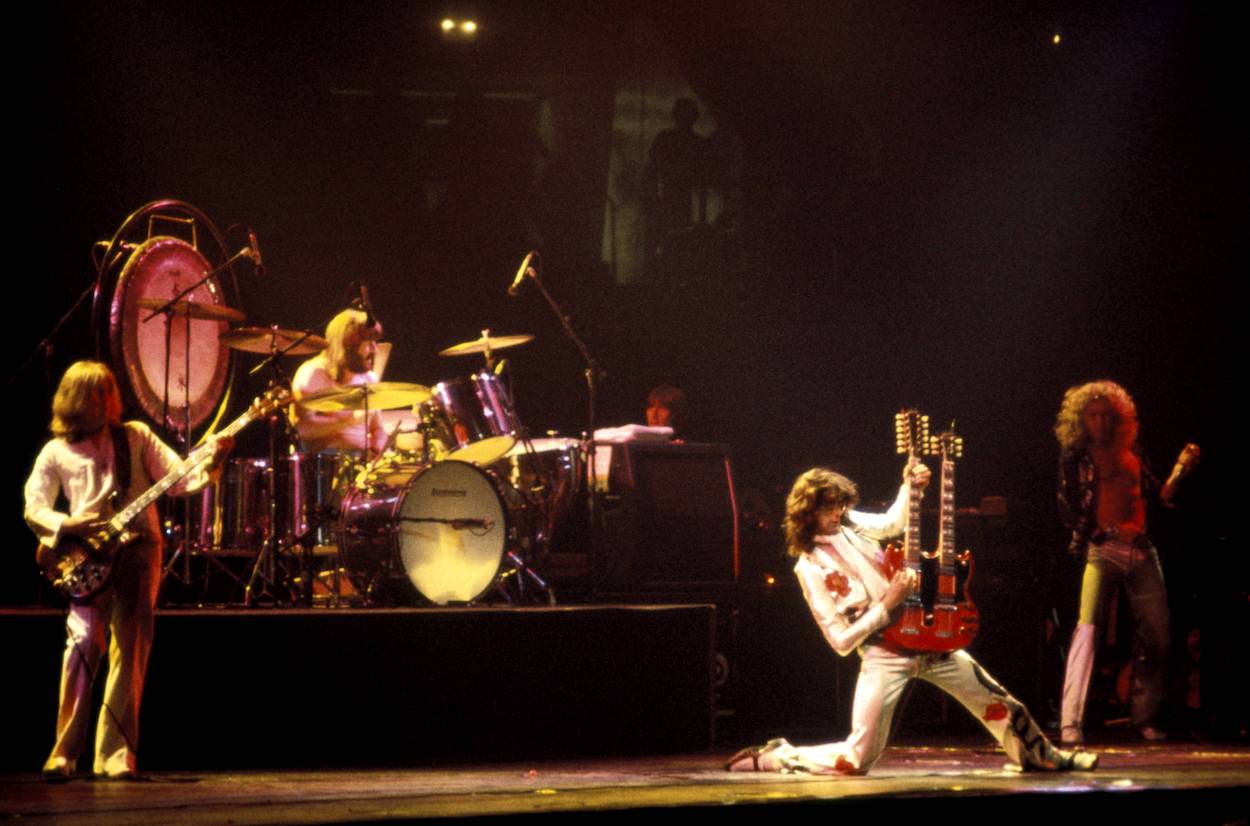
Jimmy Page Explained the Key to Led Zeppelin’s First Album
Led Zeppelin kicked open the door for heavy blues-based rock when its first album hit shelves in January 1969. Zep’s debut was so impactful that it influenced Black Sabbath to change their music. Founding guitarist Jimmy Page had a vision for Led Zeppelin from the start, and he once explained the key to making that vision a reality on Led Zeppelin I.

Led Zeppelin put out their first album less than six months after they formed
Page went from session musician to Yardbirds guitarist to Led Zeppelin founder in roughly two years. Zep became a full-fledged band in the blink of an eye, comparatively.
When the Yardbirds disbanded in the summer of 1968, Page auditioned his bandmates, rehearsed songs, recorded Led Zeppelin I in an astonishing amount of time, and started touring before the year was out.
We know the rest of the story: all-time classic tunes, underrated songs that are absolute gems, world tours, platinum albums, and a sudden end. Everything Led Zeppelin would become grew from that first album. Page wanted it to be a guitar tour de force, but he once revealed the key that unlocked the band’s potential on their debut.
Jimmy Page explained the key to Led Zeppelin’s first album
Jimmy Page founded Led Zeppelin, recorded their albums, and wrote most of their songs, but he was no dictator. He formed the band as a vehicle to showcase his guitar, but the key to Led Zeppelin’s first album, and their music in general, was that each member had a chance to shine. That was by design, as Page once told Guitar World (via YouTube):
“It was going to be a guitar tour de force, but not at the expense of the other members. This was the key to it. Everyone needed to be really, really heard. It was a guitar tour de force, but not at the expense of everybody else.
“Everyone started playing in the stratosphere, me included, because I had never played guitar like I did on that first album. John Bonham had a chance to play drums like he’s imagined playing because he’s got this great vehicle to play in. And John Paul Jones had done remarkable session work. He’s got quite a CV, but he never played like he had in this band. And it was the same for all of us. We just went on to this sort of level of playing. The synchronicity was superb. And you can hear everybody, which was the whole idea of the production of the album — you can hear everything that is going on.”
Jimmy Page explains the key to Led Zeppelin I
Page achieved his vision on Led Zeppelin I and unlocked the key to the band’s sound. Page’s guitar comes through loud and clear, but Bonham, Jones, and singer Robert Plant have equal footing.
Jones’ organ solo on “You Shook Me” is front and center. His descending bass line in “Dazed and Confused” is menacing because we can hear it. The song wouldn’t sound the same without it. Bonham’s signature powerful drum playing enhances Page’s solos on both songs.
Album closer “How Many More Times” provides all four Led Zeppelin members to shine — within the first 30 seconds. Jones’ bouncing bass line and Bonham’s cymbal taps set the table for Page’s wah-wah guitar and Plant’s background banshee howl before the song truly kicks off.
Page said the key to Led Zeppelin’s first album was having a guitar showcase but not at the expense of everyone else. It was a mission achieved, and Zep operated the same way throughout their career.
Page put his bandmates front and center several times in Zep’s career
Page created several memorable solos during Led Zeppelin’s heyday, but he always allowed his bandmates to shine.
Bonham had two drum solo songs — “Moby Dick” and the Dave Grohl favorite “Bonzo’s Montreux.” He routinely had epic drum parts, including Led Zeppelin IV closer “When the Levee Breaks.”
The band never prevented Jones from bringing his songs to the table. “No Quarter” was his baby, as was nearly everything on In Through the Out Door. Jones played a large part in writing and arranging the complex “Kashmir,” which Plant and Page both call the definitive Led Zeppelin song.
Led Zeppelin allowed Page to showcase his guitar skills, but the key to the band’s sound was that everyone had equal footing.
For more on the entertainment world and exclusive interviews, subscribe to Showbiz Cheat Sheet’s YouTube channel.


